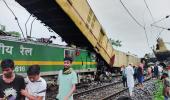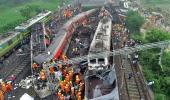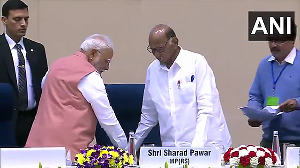'The Railways decided to go for kavach three years back, but the progress has been very slow.'

Three compartments of the express train derailed under the impact of the collision. Photograph: ANI Photo
Yet another train accident.
June 17, 2024.
A goods train collided with the Sealdah-Agartala Kanchanjunga Express, a passenger train near the Rangapani railway station in Siliguri.
Ten people were killed and more than 60 were injured.
Who is to be blamed for the accident? The goods train driver? Or, the Indian Railways that is slow to install kavach?
"The three important things that have to adopted urgently are track upgradation, installation of kavach and use of AI to collate and analyse data to generate alerts," Sudhanshu Mani -- who retired in 2018 as the general manager of the Integral Coach Factory -- tells Rediff.com's Shobha Warrier.

Let me ask you about the recent train accident that happened in Bengal this week.
Initially the Railways put the blame on the good train driver which the family condemned. They said, it was convenient for the Railways to put the blame on a person who could not defend himself.
Later, the Railways backed out of the human error claim. ...
It is human error, but human error by a couple more people, and not the driver alone.
Based on the information available, what seemed to have happened was, the station master issued an irregular caution notice not conforming to the prevailing rules, and without indicating what kind of caution the driver should exercise.
So, it appears that the station master is partly to be blamed for issuing an ambiguous caution memo.
Next, the driver should have known that he was going into a section without effective signal and should have exercised caution and not picked up speed.
So it looks like both erred.
There may be many things which we don't know yet, and the whole truth will come out only after an enquiry.
Yes, it is unfair to blame the driver alone, but the driver did have a role. So also the station master.

After the train accident that happened in June 2023 involving three trains, I had spoken to Pushpavanam, the secretary of the Consumer Protection Council, and he had remarked that the Railways had this history of blaming the driver after every accident, and always kept quiet on not upgrading the system including the tracks or introducing kavach in all trains...
I am not saying whether this happened in this case or the other, but the Railways has to take care of the duty hours of the drivers so that they are not over stressed.
Yesterday (June 19) the Railways announced a large induction of manpower. That means, they were aware of the problem of shortage of running staff but acted only after the accident.
Regarding blaming the driver alone and other staff, you blame when someone makes some mistake. It is not that they are free of blame.
What doesn't happen is, a larger scrutiny that is needed to find out whether it is something that is prevalent, is ignored and pushed under the carpet.
If that is so, the management also has to take responsibility.

Workers complain that upgradation doesn't happen as planned or promised...
See, the Railway had decided to go for kavach three years back, but the progress has been very slow.
And kavach would have prevented this accident.
So, a faster deployment of kavach all over the country is called for but that is not happening. More focus on kavach should happen, definitely.

What other areas should the Railway focus on to prevent such accidents?
Apart from sensitising staff on safety, which is rather generic, what is more specific is, upgradation of tracks and faster installation of kavach.
Money is not a problem as the Railways has lot of funds available now. They can't hide behind the excuse that money is not available.
Third is, use Artificial Intelligence to collate all the digital data available and generate meaningful alerts and follow them up with specific action instead of general sensitisation. This way, you can bring in a culture of safety.
So, the three important things that have to adopted urgently are track upgradation, installation of kavach and use of AI to collate and analyse data to generate alerts.

Some people complain that ever since the government integrated the Railway budget with the general Budget, the importance given to the Railways is gone. Do you think so?
The budget is not a problem for the Railways now. In fact, the reverse has happened. There is no dearth of money with the Railways.
But this has an impact on the financial performance of the Railways. It doesn't get scrutinised now. So, there is a sense of irresponsibility.
Of course, it is not directly related to safety, it is more related to the Railways' financial performance.
So, for safety, it is more a matter of commitment and execution ultimately.
Feature Presentation: Ashish Narsale/Rediff.com











 © 2025
© 2025